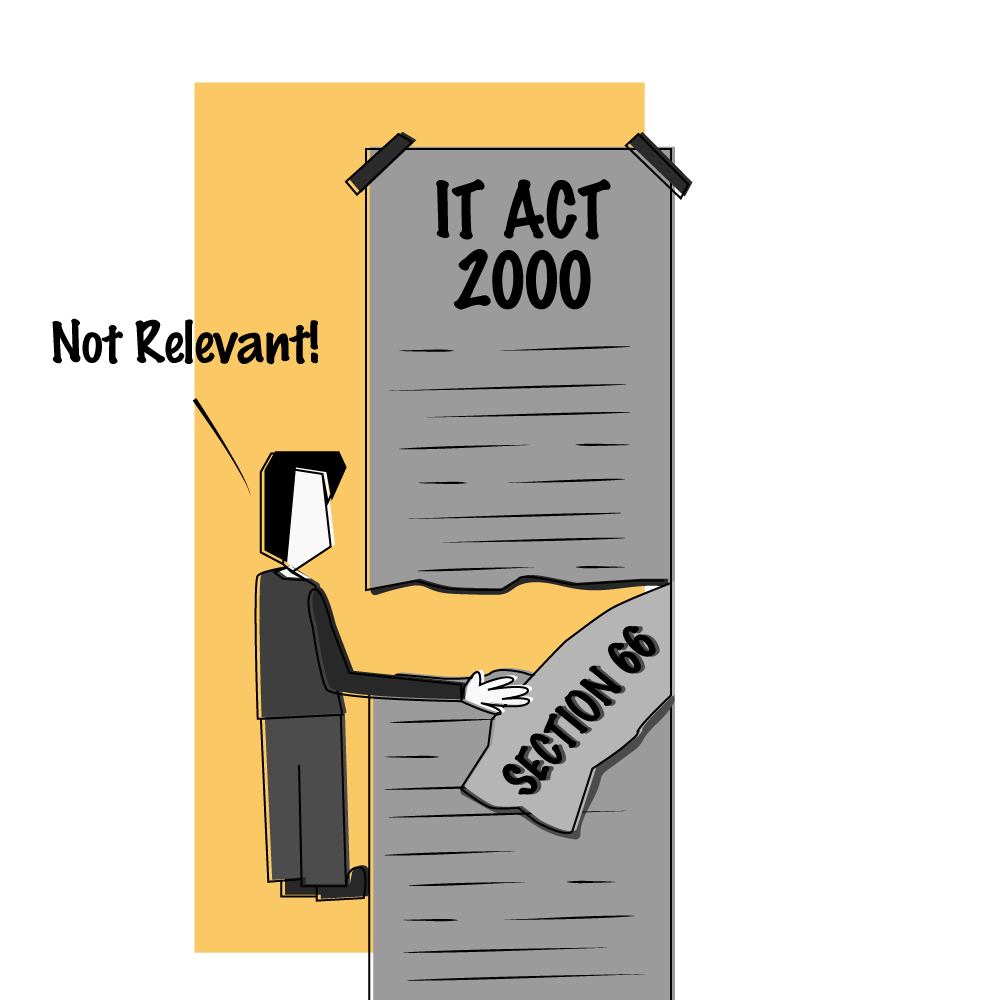Apex Court Scraps Section 66 A of the IT Act 2000

In the Supreme Court of India
Criminal original jurisdiction
Miscellaneous application No.901 of 2021 in Writ petition (criminal) No.199 of 2013
People’s Union for Civil Liberties………………… Applicant(s)/Petitioner(s)
Vs
Union of India & Ors. ………………….Non-applicant(s)/Respondent(s)
On 12th October 2022, the Supreme Court while hearing a petition filed by an NGO, Peoples Union for Civil Liberties against the Union of India, ruled that police and enforcement authorities must stop initiating prosecution under Section 66 A of the Information Technology Act 2000 (IT Act 2000) which was declared unconstitutional in a previous case – Shreya Singhal Vs Union of India in 2015. In this background, we decode the section and the landmark judgments.
Section 66 A of the IT Act 2000
Simply put, the section stated that any person who sends any information using / through a computer or electronic mail or electronic message that is:
- grossly offensive or
- has a menacing character or
- known to be false but sent for the purpose of causing annoyance, inconvenience, danger, destruction, insult, injury, criminal intimidation, enmity, hatred or ill will,
shall be punishable with imprisonment for up to 3 years and fine.
The section explained that “electronic mail” or “electronic message” means a message or information created or transmitted or received on a computer, computer system, computer resource or communication device including attachments in text, image, audio, video and any other electronic record, which may be transmitted with the message.
The Case(s)
- Shreya Singhal Vs Union of India (AIR 2015 SC 1523)
In 2012, two young Mumbai girls were arrested under section 66A of the IT Act 2000. One of them posted a comment on social media platform – Facebook on the inconvenience caused to the general public due to the funeral of a famous politician. Her friend ‘liked’ the comment. Both girls were arrested for sending messages that were “grossly offensive” and had “menacing character”. This caused a widespread furor amongst the public.
Consequently, Shreya Singhal, a law student petitioned the Supreme Court questioning the validity of Section 66A of the IT Act 2000. In the petition, she contended that provisions of Section 66 A:
(i) Were vague and arbitrary. Phrases such as “grossly offensive” and “menacing Character” are vague and uncertain.
(ii) Violative of freedom of speech and expression – fundamental right guaranteed under Article 19(1)(a) of the Indian Constitution.
While delivering a 123-page judgment, the Apex Court considered a host of celebrated previous judgments – (i) Romesh Thappar v. State of Madras, [1950] S.C.R. 594, (ii) Bennett Coleman & Co. & Ors. v. Union of India & Ors [1973] 2 S.C.R. 757, (iii) S. Khushboo v. Kanniamal & Anr., (2010) 5 SCC 600, (iv) Indian Express Newspapers (Bombay) Private Limited & Ors. v. Union of India & Ors (1985) 2 SCR 287 and other international judgments. The Apex Court ruled that:
- The provisions of Section 66 A were vague and uncertain. It does not satisfy the test of ‘reasonable restriction’ under Art. 19 (2) of the Indian Constitution.
The freedom of speech and expression under Art. 19(1)(a) are subject to reasonable restrictions under Art. 19(2) of the Indian Constitution. It means that restriction on freedom of speech, expression and movement will be allowed only if such speech and expression threaten the sovereignty and security of the State, affect friendly relations with other States, lead to defamation, contempt of court, deceny, morality, incite offence.
- The phrases used in Section 66A of the IT Act 2000 were not expressly defined. This opened the doors for multifarious (mis) interpretation and hence a tool of misuse by enforcement agencies and authorities.
Based on the above, the Supreme Court struck down Section 66 A of the IT Act 2000 as unconstitutional and violative of the fundamental right of freedom of speech and expression guaranteed under Art 19(1)(a) of the Indian Constitution. It would have a “chilling effect” on freedom of speech and expression.
2. People’s Union for Civil Liberties Vs. Union of India
In 2021, a petition was filed by the People Union NGO before the Supreme Court stating that despite the Court striking down Section 66 A of the IT Act 2000 as unconstitutional, citizens continue to face prosecution under Section 66 A of the IT Act 2000.
Taking cognizance of the issue, the Apex Court issued the following directions:
a. In the Shreya Singhal case (supra), Section 66 A of the IT Act 2000 was found violative of the freedom of speech and expression under Art 19(1)(a) of the Indian Constitution. The section was struck down. Hence no citizen could be prosecuted under the said section.
b. All cases where citizens are being prosecuted for alleged violation of Section 66 A of the IT Act 2000, shall stand dropped. The police enforcement authorities were instructed to instruct their forces not to register any complaint under section 66 A of the IT Act 2000.
c. These directions are applicable only to cases registered under Section 66 A of the IT Act 2000. Any prosecution under other facets of law would continue in accordance with law.
d. Whenever any publication (Government, semi government or private) about IT Act 2000 is made, reference to Section 66A being struck down by Supreme Court as violative has to be mentioned.
Both landmark judgments uphold the freedom of speech and expression guaranteed under Article 19(1) (a) the Indian Constitution.
For full text of judgment:
Shreya Singhal Vs Union of India
https://www.meity.gov.in/writereaddata/files/Honorable-Supreme-Court-order-dated-24th-March%202015.pdf
People’s Union for Civil Liberties Vs. Union of India
https://main.sci.gov.in/supremecourt/2021/10428/10428_2021_1_35_38928_Order_12-Oct-2022.pdf
Reference:
https://www.writinglaw.com/shreya-singhal-vs-union-of-india/

